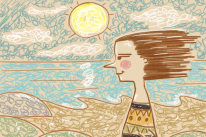
“You must love in such a way that the person you love feels free.” ~Thich Nhat Hanh
A lot of people I know who have had chronic illness, including myself, have had a hard time letting go of the feeling of “wrongness” that arises with it, in the mind.
I sometimes wonder where this comes from. When I look at our culture I get a feeling for where we get these messages. It doesn’t, generally, seem to emmanate non-judgmental compassion!
In our age of consumerism, photoshopped bodies, and a million-ways-to-look-young-and-feel-great-forever, the body’s propensity to get ill is generally seen as some kind of mistake. This may not be the spoken message, but it’s there in the subtext.
We are encouraged to believe that we can (and should) control our material universe, including our bodies, to be exactly the way we want.
When attached to, these beliefs and ideals can lead to misery.
If you’re sick, for example.
Why?
Because when it is taken as an absolute truth, we start to feel an uncomfortable stirring in the heart. A quake in the depths of ego. It usually goes something like this:
“I’m creating these conditions. It’s my fault. I must be wrong because of this.”
And if feeling like crap physically wasn’t enough, the ego-mind and the energy body join in on the party. Cue depression, self-hate, and often, a worsening of symptoms.
With a bit of perspective, it’s easy to see that this is not wisdom. This is self-harm. From the inside though, it can feel absolutely real, especially when we’ve got some teaching or another to back it up. The voice of some guru in our head whispering, “It’s your fault. You just don’t want to be healthy enough.”
Hmmm…
Luckily, in deep teachings, and in the presence of beautiful people, you never find this sort of thing.
What do you find?
You find real compassion.
You find a connection to a feeling tone of, “Oh wow, that must feel awful. What’s it like to create some space, some softness in the heart around that?”
When I was going through a terrible time, bedridden with an assortment of debilitating illnesses, this (and not judgment) was what saved my life—and my mind, which was at the mercy of its own inner tyrant! I didn’t need someone else to put some more oomph into the inner-hate.
I have one very vivid recollection of the power of compassion, from that time, when I was a monk living in a forest monastery.
One overcast October afternoon, I heard someone yelling outside the drawn curtains of my hut, as I lay there in my misery.
“Oh no, who’s that?” I thought, wanting to be left alone.
Peering outside I was surprised to see none other than the abbot of the monastery, my teacher.
“Hey Brother,” he said, with a gentle smile.
Let me give you a little context, here: Thai forest monasteries have a lot of formality, so for my teacher to call me “Brother,” and make a personal visit to my little hut cut through all that, and really went straight to the heart. For me, a sick dude in my early 20s, this meant a lot.
He came in and sat down. Asking how I was, he listened, patiently and compassionately. I tentatively began to express the despair I was feeling, not being able to get better. My heart was heavy, like a rock.
Yet I gradually got a sense that I was really being listened to, and started to become vulnerable in the safe space of his presence. To be encouraged to let down my defenses in this way was, curiously, healing in itself.
Wouldn’t it have been different if he had come in and said, “Come on, snap out of it. You need to get well. Why aren’t you trying harder?”
Ouch. That would have had the opposite effect.
So, at the end of my shpeel, he looked at me in silence, and then said, “You know, I feel like that sometimes. I felt like that yesterday, when I woke up!”
I felt my heart break open. There was a shift in my consciousness. I suddenly remembered what I had forgotten: everything is okay. This is just the mind. It will pass.
And we ended up having a good laugh about it. About the mind. About how normal it is to get hooked on suffering. And about how our bodies are ultimately out of our personal control.
Not once did he judge the state of my body. Not once did he imply that it was “my fault.”
I count this experience, and others like it, as being instrumental in beginning to get better. There is an enormous power in being held with compassion, completely free of judgment, fix-it methods, or explanations.
Just open, vulnerable compassion. I am deeply thankful for having been shown this, through the presence of someone much wiser and kinder than me. And it has provided me with an example of how to relate to myself.
Compassion is naturally judgment free; and awakened compassion has with it a quality of “I don’t know” that creates a space that says, “Nothing is wrong in this moment. With me, you, or anyone.”
Curiously, it turns out that that’s a very healing space.
When we offer this same quality to ourselves, it invites us to feel into our minds and hearts slowly, with great love and great trust. This heartfelt awareness is not a theory, a position, a view, or an aphorism. It is the openness of wisdom and compassion.
And we may need to surrender our desire to know why our bodies are the way they are at all.
In giving up needing to know for sure, a great sense of relief opens up within us. We know that the play of conditions doesn’t define our value in this world.
And we can open to our lives, just as they are, without comparing ourselves to anyone, or anything.
This, in my opinion, is the real beginning of healing.
Photo by lecates
About Peter Fernando
Peter Fernando is a mindfulness and meditation teacher. After graduating from university, he spent 9 years engaged in intensive mindfulness practice, living in Buddhist monasteries. He runs the online course A Month of Mindfulness and is the author of Unconditionally Valuable a booklet available on Amazon.com.












 Though I run this site, it is not mine. It's ours. It's not about me. It's about us. Your stories and your wisdom are just as meaningful as mine.
Though I run this site, it is not mine. It's ours. It's not about me. It's about us. Your stories and your wisdom are just as meaningful as mine.
First off, Thich Nhat Hanh is one of my heroes, so great start to this post! The Art of Power is insanely deep, and profoundly simple (read it y’all).
Peter, thank you for your authenticity and your story. I love those moments of clarity that come after suffering. The goal is obviously to gain that clarity without having to suffer (still working on that). Either way, it was a great reminder that we spend too much time in our minds, suffering without reason.
Thank you again.
Thank you too, Jeffrey. Haven’t read The Art of Power – will check it out… And yes, ‘suffering without reason’ – I know it well 🙂 Ha!
Peter, thank you so much for this. I appreciate your honesty and the reminder that it is too easy to believe and get lost in our thoughts. As one who hopes to bring healing to others (as well as heal myself!), your writing touched me deeply.
Aw, thanks so much Bobbi. Really appreciate your feedback!
“In giving up needing to know for sure, a great sense of relief opens up within us.”
How? How does one “give up” this need? I can successfully deny myself the futility of looking… but that isn’t the same (I think) as what is implied here. I still want to know. I still resent the fact I can’t know. I am still disgusted with an existance which prevents my knowing.
I want that “great sense of relief,” and yet most often fear it is beyond me.
Thanks for sharing so honestly, Tantrika. It’s a good question – as there are many kinds of knowing. For me it’s always a matter of feeling my relationship to them; and whether or not that way of relating generates more suffering. The example above is one of the areas that does, for me, if I buy into it! There’s always a sense of incompleteness and lack… But maybe it’s because I have such a nebulously defined condition 🙂
But it really is for each of us to navigate in an intimate, personal way. There’s nothing wrong with wanting to know, if it is in harmony with a sense of ease and self-kindness in the heart, I think.
Thank you, I have been searching through a metaphysical route some sense to my pain. It is the suffering that I am choosing that is hurting. Time to let go. With love Gill
Thank you too, Gill. Glad it was useful for you. I wish you very well!
Hey Peter, what an incredibly moving story. You know, we don’t all have stories like that and to be able to connect with others who can pass along these things is priceless … kudos to you and to Lori. 🙂
You said how giving up the need to know for sure was important. It’s funny how when you give up the need to know, you end up knowing far more. It’s probably not the “knowing” you were after but it comes to a much deeper knowing that empowers you.
Thanks for this, Peter. And all the best to you!
Ah, yes indeed – well put! The deeper knowing that comes from the letting go of the more conventional one – it’s funny indeed. And continually surprising. One of the wonderful paradoxes of the mind/heart isn’t it? Thanks so much for your kind feedback!! And all blessings to you too.
Very powerful, thank you! I am trying to apply mindfull listening with my coworkers and friends. It is hard, but I find that just being present while you listen is sometimes the best gift you can give people.
Absolutely – sometimes all we really want/need is to be listened to. It’s easy to forget that, but yeah, the best gift indeed 🙂 To give, and to receive. x
Wonderful post, Peter! I loved reading your story. It is indeed difficult not to judge our bodies in either direction (negatively or positively). But it’s also difficult not to feel betrayed by the body during times of illness and darkness. Knowing that we can let go and allow our bodies to heal is tough when we don’t trust them. But having an outside example of non-judgement and mindfulness is such a blessing. We heal faster when we see ourselves as whole- through our eyes or through the eyes of our brothers. 😉 Thank you for sharing, Peter.
Thanks Erin – you describe the predicament very well! So glad you enjoyed reading the post 🙂 ‘We heal faster when we see ourselves as whole’ – so true, so true. Thanks for sharing your reflections!!
Peter – This was wonderful. Thank you for sharing your experience. I’ve written a book on living with chronic illness called “How to Be Sick: A Buddhist-Inspired Guide for the Chronically Ill and Their Caregivers” and your essay comes closest to anything else I’ve read to capturing what I was trying to convey in my book. It’s not our fault that we have physical difficulties. We’re in bodies and they get sick and injured—and old. This is what the Buddha discovered when, as a young man, he ventured forth from his protected life behind the palace walls. We may not be able to heal our bodies, but we can heal our minds. And we’re so fortunate that the Buddha left us so many practical tools for doing that — from mindfulness to lovingkindness to compassion. Thanks so much for your piece.
Hello Toni!! Thank you so much for your generous and kind feedback 🙂
Yes, I have been recommended your book by many friends in NZ for a while now. I’ve been a bit slack, but it’s on my list of wonderful books I must get! One of my friends who suffers from M.E found ‘How to Be Sick’ very transformative, and it has had beautiful effects on her life.
And, yeah, I love that quote from the Buddha – “Although my body is sick, my mind will not be sick – this is how you should train yourself”. That has got me through some dark nights of self-blame and resentment on the journey…
Sending warmest wishes to you, Toni. x
At first when I read this, I thought, I truly do believe we do have control of our bodies, otherwise we are saying our mind and body are separate. This is not the case. However, I realised that this is a judgement. That because I have studied how dysfunction in our mind can lead to illness in our bodies, I have developed a very ‘black and white’ view that any illness must be through something we have not balanced in our thoughts. On a quantum level this may of course be the case. However, it is what it is and the judgement should be removed and the illness allowed to be.
In acknowledging the ilness is there you are practising acceptance and with this comes the ability to let go. Perhaps at this point of awareness, there is almost a oneness with the illness; you are removing the suffering and the illness passes.
Apportioning the blame on yourself for the illness clearly IS self harm.
I have seen illness in a very different light after reading this post, thank you.
Really appreciate hearing your contemplations, Shelley. Yeah, it’s an interesting paradox, that’s for sure. You capture it beautifully!! Indeed, pragmatic self-kindness is where it’s at 🙂 I love your description of ‘oneness with illness’ – yeah, that seems to be the real healing balm.Thank you for your wise and considerate words!!
Peter,
You have perfectly described feelings I have had and continue to have on my journey. My body has metastatic breast cancer and it has been my companion and teacher for 12 years. I choose to see its presence as a gift. Chronic illness is a constant connection to the power of mindfulness and the present moment. Our society is obsessed with the illusion of control and very uncomfortable with the body’s mortality. People don’t want to listen. They want to fix it, explain it, and they are often uncomfortable with it. I have often been annoyed with the language used he cancer community… “She fought it and won.” Or “he lost his battle”. These collective thoughts imply control over our body’s illness. People would like to believe if they “fight” hard enough the they can beat it.
I chose long ago to stop fighting this illness and to accept it as part of me and part of my life. It is a gift, a teacher. I feel you and all of those who have commented are listening…simply beautiful
Thanks so much for sharing your profound insight, Cinnamon. It is humbling and inspiring.
I can totally resonate with everything you have shared.
Your deep wisdom emanates from the words on the screen. I wish you everything wonderful!
I cried as I read this! I have suffered with Chronic health issues for the past 7 years! I get NO support from my “somewhat” boyfriend! He tells me its all in my head and that I need to “Get over it” On the days when I am feeling REALLY bad, he does nothing but criticize all my actions throughout the day! Which of course then makes me question if he is right, is it all in my head?? I struggle with my physical and emotional abilities on a daily basis, I tell myself I should be able to get past this, I should be able to live life normally. I am trying to look at things differently since finding this sight a few months ago, however I still struggle with what others think of my health issues and how I try to manage it.
Thank you for sharing your story
The feelings you describe are amplified in many people who were made to feel inadequate when they were children. It is important to go back and understand the root cause of feelings of lack of self worth, often with the help of a good therapist. It can be very difficult, if not impossible, for the mind with the problem to understand and change perspective alone.